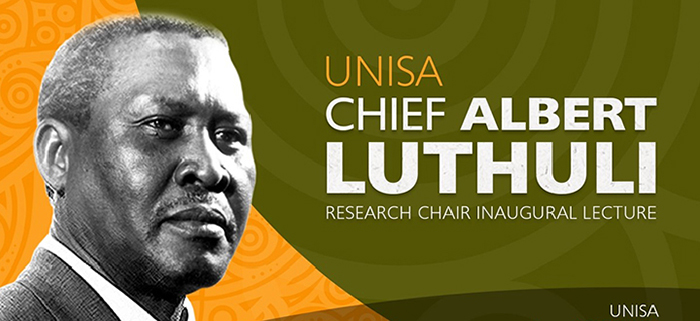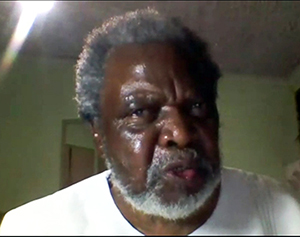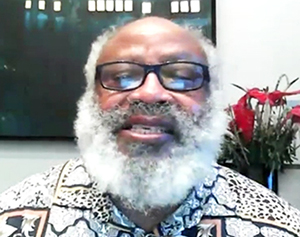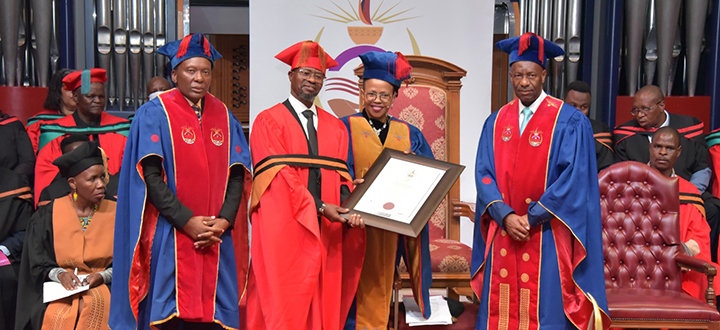News & Media
The road to transform higher education
Prof Muxe Nkondo, Unisa Council member and former Vice-Chancellor of the University of Venda, delivered the second Chief Albert Luthuli Research Chair Lecture on 26 November 2020. Entitled "Universities of science and technology for rural development as freedom and justice: The politics of evidence and decision", the virtual lecture was organised by Unisa in partnership with the Luthuli Museum Council.

In his presentation, Nkondo pointed out that the name Albert Luthuli Research Chair creates a brave new world of thought, feeling, attitude and action in which the university conceives its new identity. "This involves the initiating efficacy of naming acts, political and executive power, ethical responsibility and obligation, the translation of ideology from one historical period to another," stated Nkondo.

Prof Muxe Nkondo (Unisa Council member) delivered the 2020 Chief Albert Luthuli Research Chair Lecture.
"So, the name in this context is one of the great complex political words in our national educational system that gives direction on how to fundamentally transform higher education and training in South Africa (SA). The name legislates educational meaning and creates a conceptual and political landscape for the university community that generates historical narrative and vision."
Sharing his views on business sciences for rural development, Nkondo perceives enduring inequalities in a SA lacking fundamental transformation of the rural economy. From regional inequality in access to technically exploitable knowledge to rampant health imbalances, he explained that rural development points to the need to move away from the urban-centric development modes that dominate the current trajectory towards an integrated and inclusive approach.
Building rural communities to boost the knowledge economy
"We need a just economy that integrates rural and urban communities. Rural communities have a legitimate aspiration to achieve the full meaning of freedom in the fourth industrial revolution (4IR), but if the national development plan (NDP) is to be successful, it needs to start rethinking the role of universities of science and technology in redressing regional imbalances as part of the development of smart cities in rural areas," said Nkondo. Not only is this approach fundamentally retrospective and introspective that seeks justice, but it is also pragmatic, given the knowledge limitations that inhibit agency and freedom in communities.
In Nkondo’s view, the future of rural development hangs in the balance. "Universities of science and technology would, among other things, provide a resource for enhancing the right kinds and levels of knowledge and skills so critical in the 4IR. A holistic approach would provide a curriculum framework integrating science, technology, trade and industry. It would examine building blocks needed to grasp the nature of entrepreneurship in the knowledge economy and provide guidance on how to build educated and industrial environments supporting that integration," he proposed.
Alluding to Luthuli’s legacy amid Covid-19, Prof Mandla Makhanya, Principal and Vice-Chancellor of Unisa, reflected on his perseverance when he went back to study after being expelled from school. "We learn the dedication to the education of the nation, as he gave his all to educate the poor rural students. We learn the dedication to the people of this country, as he gave up the privileges to be in the good books of the apartheid government, to a point of being dethroned from chieftaincy."
"We should, as an institution, take a leaf from the life of Luthuli and ensure that the university remains the one institution that continues to provide education to everyone, including, in fact, especially, to the rural students who arguably need this education the most," Makhanya concluded.
Freedom, justice, peace and prosperity for mankind

Important Mkhize, Chairperson: Luthuli Museum Council
Chairperson of the Luthuli Museum Council, Important Mkhize, added that Luthuli was a dynamic revolutionary clothed in theology. "To him Christian religion was a weapon tool to liberate his people. It became part of his life and conscious, a source of courage, resilience and invisibility; simply put, something that was an anchor and a base for him from which to launch his missiles of peace, prosperity, justice and freedom to opponents of a noble cause he stood for," he said.
Mkhize thanked Unisa for housing and institutionalising the Luthuli Research Chair as these platforms are aimed at enhancing the strength and strategic advancement of institutions of higher learning, communities and broader society. "Universities should not be ivory towers that produce men and women who are self-centred and individualistic, pursuing a lifestyle of opulence and conspicuous consumption and remaining aloof to the plight and needs of their society. This must change," he lambasted.
This research chair should brighten and illuminate the legacy of Luthuli and carry out the work he would have continued to do had he been alive today. It should nurture young talent from all levels of schooling that is vocation, academic and intellectual from foundation to tertiary striving to end poverty, joblessness, ignorance, illiteracy and culture of corruption.
During the lecture, three panellists - Prof Kgomotso Masemola, the Executive Dean of Unisa’s College of Human Sciences; Prof Siphamandla Zondi from the University of Johannesburg; and Nana Ngobese, Executive Director of Oro Projects - responded to Nkondo’s presentation, highlighting critical issues in situating Luthuli’s legacy around the theme.
* By Lesego Ravhudzulo, Journalist, Department of Institutional Advancement
Publish date: 2020-12-01 00:00:00.0

 Young Unisa doctoral graduate joins elite Lindau Nobel Laureate group
Young Unisa doctoral graduate joins elite Lindau Nobel Laureate group
 Education MEC addresses Unisa autism seminar
Education MEC addresses Unisa autism seminar
 Seven Unisans nominated for the NSTF-South32 Awards 2023/2024
Seven Unisans nominated for the NSTF-South32 Awards 2023/2024
 Unisa awards posthumous honorary doctorate to literary maven, OK Matsepe
Unisa awards posthumous honorary doctorate to literary maven, OK Matsepe
 From humble beginnings to academic leadership
From humble beginnings to academic leadership